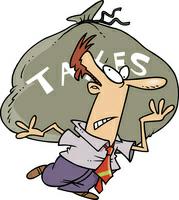Latest Blog Post
IRS Tax Liens Defined
Issued by The Internal Revenue Service, IRS tax liens are a part of the US Department of Treasury. The job of the IRS is to collect all the federal tax revenue from individuals and businesses in the United States. When an individual is unable to pay his annual tax bill, the IRS can place a tax lien on his real estate and personal property he owns until the debt is fully paid.
With debts from the IRS, it can result in the personal property loss including the house, car, and other items of worth. Tax liens give the government claim to the property to recover from the government’s loss.
Once the government is able to accomplish the initial requirement to give notice to the taxpayer about his debt and payment still has not been received, the IRS can then place a tax lien on all properties for the tax debt amount with penalties and interest. Once the lien is filed, all other creditors will be notified since federal tax liens take precedence over others in most circumstances.
If the taxpayer dissents with the IRS notice, he has the chance to have an appeal on the decision through Collection Due Process at a hearing in IRS’ Office of the Appeals.
Four Factors to Consider in Due Diligence
You need to consider these four factors that will help you do due diligence the right way.
Foreclosure
When you buy a tax deed of a property that is defaulted by tax, you will get to own the property free and clear of debts as a tax lien is number one to record. It is also given much importance compared to other interests of the property including loans.
However, there are cases wherein you will encounter a case in which the tax lien is a part of a property’s security interest. This may happen where the property owner has debts to creditors such as IRS or it has become income or sales tax delinquent to the state government. There are also states where the mechanic’s lien is entitled to a right of a property share when it does sell.
Environment Factors
Oftentimes, commercial properties are concerned with environmental factors. In fact, the Superfund Act that is passed by the Congress state that anyone who buys real estate which is hazardous environmentally can be liable. So if you do buy a parcel of real estate wherein there is a fuel tank buried, you may be responsible for cleaning it which can prove to be quite expensive.
Additional Fees
There is a possibility that you might encounter other lien holders in a property. You will need to do proper research on this so this won’t be an issue to you.
Bankruptcy
You will also need to research whether the delinquent property owner has filed for bankruptcy. If someone has already started filing for bankruptcy when his property is already up for sale, this may involve your right to the property. If the property owner has filed for bankruptcy during the redemption period, you might be involved in a court battle for rights to have a clear title which could take a long time wherein you will be unable to recover the funds you have spent.
Benefits and Risks of Tax Liens
Here are the benefits of tax liens:
1.) Tax liens are high priority liens. They take precedence over mortgage liens, trust deeds, judgment liens, and more.
2.) Right to collect interest and right to foreclose. You see, if the tax lien is redeemed, you can collect large returns. However, if the delinquent property owner is not able to pay it off, you can foreclose and may get full property ownership rights.
3.) No need to chase up payments. This is the county’s responsibility so you need not worry.
4.) Tax lien investment is secured. Tax liens are usually for small fractions of the market value of the property.
5.) You are not subject to land owner liability.
6.) High interest rates. Rates may go from 16% to 24%.
7.) Low risk.
8.) Low maintenance.
Now, let’s take a look at the risks and things you need to do when you invest in tax liens:
1.) You will need to assess the property. You will need to go see the property itself even if you are just purchasing the tax lien as the value and security of the tax lien is based on the actual property.
2.) The property’s market value. Factors such as location, zoning regulations, flood paths, city restrictions, etc. affect the value of the property’s tax lien. You will need to research on these.
3.) Some states have the property tax liens share equal priority with state tax liens and federal liens. You will need to research for liens that may have survived on the property.
4.) If the delinquent property owner is also bankrupt after you have purchased the lien, there are cases wherein the tax lien payment has to wait until all the administration expenses have been paid off.
5.) There could be delays in foreclosure if the tax lien is done by the FDIC (Federal Deposit Insurance Corporation) so always check if this is your case.
Looking Up For Tax Liens
Liens show up on property records whether it is federal tax liens or county tax liens. With this, the computer is the main source you need to utilize to look up for tax liens – either you’re an investor who wants to invest in tax liens or you’re a property owner who plans to pay the tax lien off on your property.
Here are ways to look up for tax liens:
1.) Find out the county website. Utilize the National Association of Counties website to uncover if the county where you plan to invest has its own website.
2.) Search the county website. Do a tax lien search on the county website. Search for liens on a property with the use of the property owner’s name, parcel number, or address. Oftentimes, the website list schedules and procedures for both paying off or buying tax liens at upcoming tax lien sales.
3.) Review tax liens. The website provides significant information about the tax lien on the property. Usually it includes the date and payoff procedures and the amount of the tax lien.
Now if the county where you plan to invest in does not have a website or cannot conduct online tax lien searches, you will need to look up for the address of the county clerk’s office. Check their schedules of operation and get the tax lien information.
There are also counties which can provide details of the tax lien over the phone. If you want to have a copy of the tax lien information, there is often a charge for it.
There are also websites that sell tax lien lists but remember, do some research on the website first to make sure it is legit.
Order of Liens on a Property
If you want to purchase a property’s tax lien, you have to know which county or state is conducive that might let you end up as the owner. Also, you might also want to think of buying tax deeds as it provides you better chances of owning properties.
To purchase tax lien certificates, you have to attend the tax sale auctions and bid. The process may vary from county to county or state to state. Now if you won the bid for the property’s tax lien certificate, you will have to foreclose on the assets you have. This method may be different for some states but oftentimes, you need to wait until the redemption period is finished for you to begin foreclosure. Redemption periods may usually take 6 months to 2 years.
The listed below are the different kinds of liens:
1.) IRS Liens
These liens are prioritized over any other liens on a property. Once you know the IRS lien’s amount, you can speak with the IRS and make negotiations just how much they are willing to agree to forgive the arrearage.
Real Estate Liens are next on the list of priorities and these need to be satisfied. If you attend an auction and you have paid just enough for the property’s first mortgage, everything under the priority list will be wiped away. Now if you purchase a second mortgage that means you also have purchased everything above that on the list of priorities.
3.) Other liens:
- Second Mortgage
- Homeowner’s Association Fees
- Mechanic’s Lien
- Lawsuit
- Judgment
These liens on the priority list go by the date by when they were filed at the County Recorder’s Office.
Tax Liens Redemption Periods
A redemption period is the specific frame of time wherein if the property owner is not able to pay off the tax lien, the investor can have the property foreclosed and may get the property for pennies on the dollar. If however, the property owner is able to pay off the tax lien including the penalties and interest, he can then redeem the property.
So when does redemption happen? It could actually happen a day after you bought the lien or it could be weeks later, months, or even years. It just depends on the situation.
Now before you start to invest in tax liens, you must know the redemption period as it varies from state to state. While some states have short redemption periods, others can have really long redemption periods so it is important to familiarize the rules of the state/county you are interested in investing in. Take note that if you are to invest in states with long redemption periods, you can get high interest rates while if you want to get really cheap properties, then check states with short redemption periods.
While on redemption period, you are required to do some pre-foreclosure activities with your tax lien such as sending notice to the property owner that you have the tax lien, giving notice to newspapers, filing court documents, and doing title searches. But you don’t have to worry much as these things are often taken care of by an attorney. In most states, fees for your attorney are added to the lien’s total value and will be reimbursed at redemption with interest.
Remember, it is important to follow the specific state laws when purchasing tax liens as you would not want your tax lien to be invalid just because you have missed a significant pre-foreclosure activity.
Tax Liens and Credit Reports
We all know by now that tax liens are one of the things we surely don’t want to show up on our credit reports or against our properties. And yes, the IRS will do things indeed just to make sure you will pay whatever you owe.
When tax liens are in your credit, you are not going to get a home mortgage and even car loans, credit cards, and student loans. Unfortunately, though you may have paid off the tax liens, it will probably still be visible on your credit report for several years. And if you don’t get to pay the tax liens off, it will show up for more than 10 years.
To get the negative listing off your credit report (after you have paid off the tax liens), you can file a dispute to the credit report agency. Be sure to forward double copies of these: Equifax, TransUnion, and Experian. With the Fair Credit Reporting Act, you can dispute misleading or unfair credits. It is advisable to research and learn more about your rights just to ensure more successful financial reports in the future.
After you have paid off all your tax lien debts, you have to request to have those bad records removed from your credit report. To have your credit repaired, you can go to a credit repair company.
It is your major responsibility to check your credit report is accurate and of course, positive as much as possible.
What is Deed in Lieu of Foreclosure?
If you’re a property owner who wants to stop a foreclosure on your property, there are actually several ways to do that. One of which is called the short sale wherein you sell the home. Another way is to battle the banker in the court wherein there is a big chance you will win. Also, you can do a deed in lieu of foreclosure. So what exactly is it?
In deed of lieu of foreclosure, these deeds back the property to the lender to avoid the foreclosure process. When you give back your property, you make an effort to stop the pressure of foreclosure and damages to your credit. Take note that this method is best for those who are okay to not keep their homes.
In this method, there will be documentation involved and it would be significant that you do it right. Usually, the documentation includes a binding agreement that goes with deed in lieu of foreclosure or deed in lieu to the banker or even deed in lieu to the mortgage corporation. Your documents should show that the Promissory Note of the banker’s consideration for providing residence is satisfied and is “Paid in Full”. If these words are not part of your documentation, the lender may still bother you and ask you for your payments in reference to the Promissory Note. However, if this has been included in your paperwork along with the deed in lieu, you will have no more responsibilities to the loan provider.
Learn More About Tax Deed Overages
What are tax deed overages? Well, these are funds that have been left over when the bidder bids more than the owed taxes on a property at the tax sale. These tax deed overages may range from a few hundred dollars to hundred thousand dollars. They are being held for the owner of the delinquent property to collect for some time period where the government will then get the money. Now, one thing you have to know is that owners do not really know about these overages so these funds usually just sit where they escheat to the government.
Now, due to some loophole in the rules, tax deed overages are usually not governed by the finder’s fee limits. So the meaning is simple – if you somehow connect the owner with his funds, you can actually charge no matter how much as a finder’s fee. And yes, it’s legal. As mentioned previously, owners are often clueless about these funds that some of them are glad to accept a finder’s fee of 50%. And this would mean that for a property which has an overage of $30,000, you will get $15,000 as a finder’s fee. Isn’t that amazing?
Since the foreclosure rate these days are always on top, this ensures you that tax overages will never go away and if you don’t step up as the finder, these funds will just automatically be lost to the government.
All About Deed Grabbing
Have you heard of the term “deed grabbing”? Well, if you’re interested in joining the real estate industry, you should probably know that deed grabbing is the when you obtain tax sale properties without the need to attend the tax sale auction. Yes, all you need to do is approach the property owners before they will lose the property due to delinquent taxes and then offer them to buy their homes for fractions of their properties’ values.
Usually, the deed grabbers are in competition with tax sale companies as they usually grab these properties just right before companies can grasp – just before the properties are about to be foreclosed.
To do deed grabbing, you need to know that there is a year or so before tax investing companies can foreclose on properties that have been already sold at the tax sale auctions so this would be your best time to approach the property owners and offer to buy their properties. Just so you know, these delinquent property owners know about this process already and usually, a lot of them will be glad to offer them to deed grabbers like you to avoid having the big tax companies get their properties instead. You can actually get deeds for just a few hundred dollars at this period.
Also, for delinquent property owners, deed grabbers like you are their last call for help as they would lose everything if you wouldn’t come and buy their property instead. Deed grabbing is definitely one of the best methods to acquire tax sale properties without having to attend the tax auctions. And yes, you are also helping out the property owner.
Click Here To Get Your Free Tax Lien Training System ($77 Value)
- Exactly How To Start Buying Tax Liens Today
- Tips For Tax Lien Auction Success
- How To Avoid The Mistakes New Tax Lien Investors Make

Search
Categories
Archives
- July 2015
- June 2015
- May 2015
- April 2015
- March 2015
- February 2015
- January 2015
- December 2014
- November 2014
- October 2014
- September 2014
- August 2014
- July 2014
- June 2014
- May 2014
- April 2014
- March 2014
- February 2014
- January 2014
- December 2013
- November 2013
- October 2013
- September 2013
- August 2013
- July 2013
- June 2013
- May 2013
- April 2013
- March 2013
- February 2013
- January 2013
- December 2012
- November 2012
- October 2012
- September 2012
- August 2012
- July 2012
- June 2012
- May 2012
- April 2012
- March 2012
- August 2011
- July 2011
- June 2011
- May 2011
- April 2011
- March 2011
- February 2011
- January 2011














